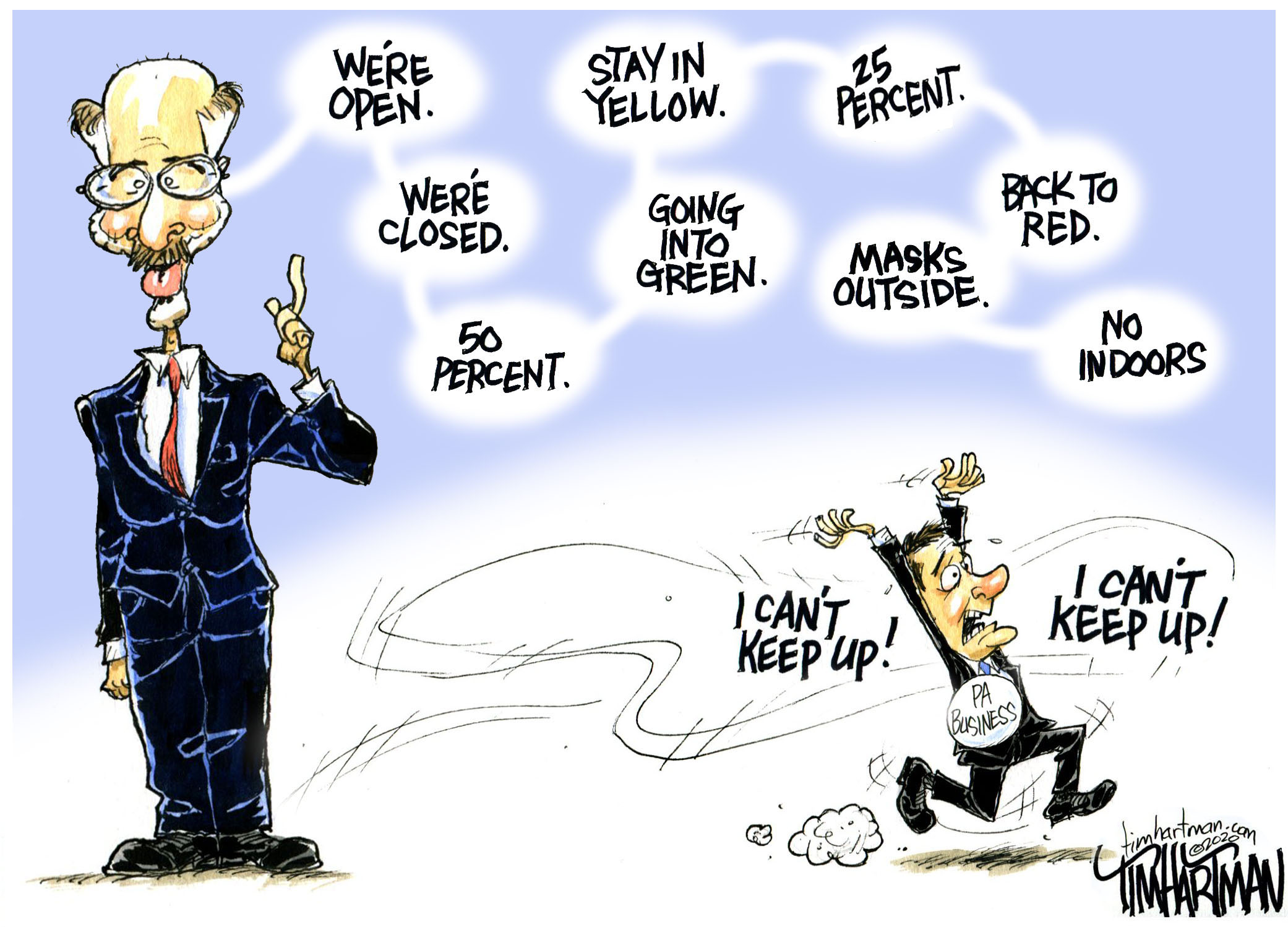Bars and restaurants in Pennsylvania are sounding the alarm, warning that mass closures are on the horizon due to unnecessarily strict government regulations.
A new report from the National Restaurant Association says that 91% of Pennsylvania business owners in the industry had laid off or furloughed 332,000 employees since March. That means about half of the 600,000 Pennsylvanians who work in the industry have lost their jobs, either temporarily or permanently.
At recent meeting of restaurant owners in Westmoreland County last week, Kirk Kim, co-owner of The Olde Spitfire Grille in Greensburg, said, “As soon as the weather changes, the 25% (indoor occupancy restriction) is going to kill everybody.”
Kim was referencing a statewide regulation implemented by the Wolf administration that limits in-door occupancy in restaurants and bars to 25%—no matter the health measures implemented by individual businesses or local COVID case stats. In an attempt to survive, many restaurants have purchased tents to make room for outdoor seating, but those will become unusable when the weather turns cold.
At a hearing held by the Pa. House at the end of July, John Longstreet, the president and CEO of the Pa. Restaurant & Lodging Association told lawmakers that approximately 7,500 restaurants could close because of these restrictions. In an Aug. 26 op-ed in the Inquirer, Longstreet said that the governor should immediately increase the occupancy restriction to 50% to give bars and restaurants a “fighting chance.”
The Wolf administration has insisted that they made the decision based on data linking a recent surge in COVID cases to bars and restaurants. Until last week.
After a CBS21 reporter in Harrisburg did a six-part reporting series to obtain the administration’s data, the Pa. Department of Health finally released it. But the released data failed to illustrate the purported link between bars and restaurants and COVID cases. In fact, Wolf admitted that the data was a “very small part” of his decision to implement these restrictions, abandoning his administration’s initial arguments.

Upon further analysis, it seems that until two days before Wolf's mandate, the state wasn't collecting data on bars and restaurants. And in the released data collected since, fewer than 5% of the new positive COVID could be associated with a bar or restaurant.
“The Wolf administration’s blatant disregard for the truth and transparency in implementing this regulation without the data they claimed they had is harming hundreds of thousands of people’s livelihoods,” said Commonwealth Foundation Policy Analyst Andrew Abramczyk.
Many lawmakers in Harrisburg have consistently decried the 25% occupancy restriction as disastrous and have started to propose legislation aimed at mitigating closures.
In a letter to Gov. Wolf and Sec. Levine reacting to the initial implementation of the restrictions, Senate Democrats noted that, “In many cases these regulations do not make sense for fighting COVID-19 and threaten the profitability of restaurants and taverns. So many of these businesses are owned and run by families that have put their lifeblood into their creation and operation.”
Rep. Gary Day, R- Lehigh and Berks Counties, has sponsored House Bill 2789, which would allow restaurants to avoid paying sales taxes until restrictions on their operations are removed.
Sen. Patrick Stefano, R-Fayette County, has proposed four bills that would, according to his news release:
- Remove the 25% occupancy restriction while maintaining social distancing requirements.
- Remove the restriction on bar services and the requirement that patrons must purchase a meal to buy alcoholic beverages.
- Allow liquor licensees to expand outdoor dining areas to within 250 feet of their premises.
- Waive license renewal and permit fees that are paid by restaurants and taverns for one year.
Rep. Tina Davis, D-Levittown, and Rep. Joe Ciresi, D-Royersford, have sponsored House Bill 2791, which aligns with state Democrats’ consistent position of directing more taxpayer dollars to businesses via grants. A similar program aimed at small businesses of any industry has been overrun with applications, which is seen by many as evidence of the need to give small businesses more freedom to operate safely.
“Even without these onerous restrictions, restaurants and bars would be having a tough time because most people want to avoid catching COVID by spending time indoors with large groups,” said Abramczyk. “But our government should be finding ways to help our local businesses to operate to the maximum extent possible while being safe, not placing haphazard roadblocks in their way without justification.”
RELATED : JOBS & ECONOMY, ECONOMY, REGULATION





